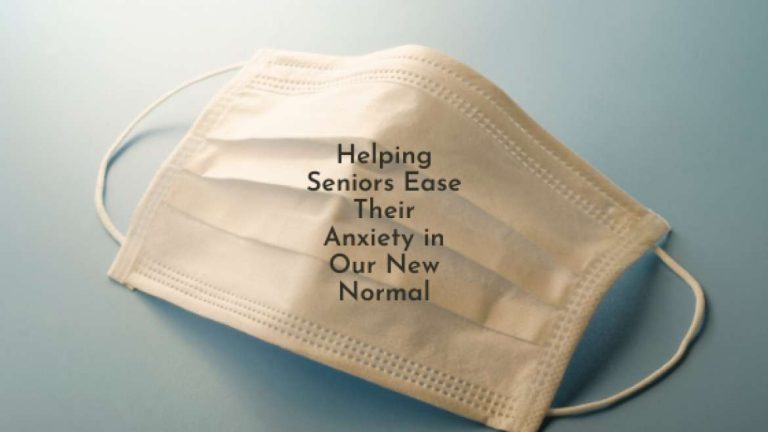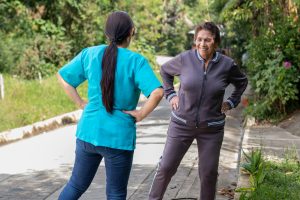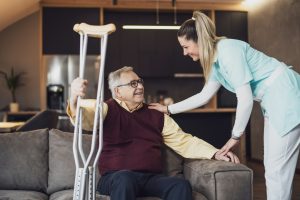We’ve all been a little on edge lately. Between COVID-19, a heated political landscape and an economic downturn, we’ve turned to friendships and self-care to cope with the unknown and settle those butterflies we feel every time we turn on the TV.
For older adults who are both homebound and socially isolated due to the continued risk of COVID-19, that constant state of worry paired with the effects of aging and chronic health conditions can cause anxiety to skyrocket if they don’t have coping mechanisms in place. By the end of April 2020, three in five Americans were still scared they would contract the virus, and 16 percent of people over age 55 were “very scared” of the disease.
With more than two million seniors suffering from anxiety and depression each year, diagnosis and treatment are more important than ever before. As friends and family members, you play a key role in identifying signs of mental health issues and connecting your loved one to the care they need.
What is generalized anxiety disorder (GAD)?
Everyone feels anxious from time to time, but when someone’s anxiety and worry over things they can’t control interfere with their daily activities over a long period of time, it often signals the person is suffering from GAD. When left untreated, anxiety can lead to higher rates of heart disease and high blood pressure, a weakened immune system, panic attacks, self-harm, and severe depression.
While anxiety is often genetic or caused by trauma, other factors can increase a senior’s risk of the condition:
- Early-stage dementia or Alzheimer’s disease
- Side effects of certain medications
- Chronic health conditions, including COPD, thyroid disease and diabetes
- Diagnosis of a life-changing condition
- Loss of a friend or family member
- Sleep disturbances
- Social isolation or lack of a support system
How you can help your loved one manage their anxiety
Anxiety can manifest itself in your loved one in a variety of ways, from excessive worry about their safety and the avoidance of social situations to hoarding and a preoccupation with routines. If you notice temporary worries escalate into long-term obsessions, it’s important to address them immediately.
- Provide a shoulder to lean on. When your loved one becomes worried and agitated, acknowledge their concern. “I’m scared of COVID-19, too, Mom, but we’re doing everything we can to protect ourselves, and the hospitals are now better prepared to address it.” Don’t offer false reassurances, diminish their concern or feed into their worry.
- Build up their support system. As dangerous as COVID-19 is, social isolation can also be life-threatening. Loneliness and isolation can increase a senior’s risk of anxiety as well as stroke and coronary artery disease. Visit with your loved one as much as you can, connect them to friends and family by computer or phone, and now that St. Louis and surrounding counties are reopening, be sure they’re getting outside to safely connect with others if possible.
- Turn off the TV. When seniors are isolated, they often spend hours in front of the TV, and with our constant 24-hour news cycle, they’re continually bombarded with bad news. Add social media to the mix, and anxiety levels increase dramatically. Anxiety experts recommend that people limit their daily news consumption to 30 minutes of a reputable news show or 10 high-quality articles each day. Encourage your loved one to call a friend, read a book for pleasure, or check out some feel-good sitcoms instead.
- Share healthy coping mechanisms. Intentional breathing can help calm panic attacks when your loved one feels them bubbling up. Watch a YouTube video about meditation or safe yoga positions with your loved one and try them out together. Suggest they take a walk outside to breathe in the fresh air. Or, download an app like Calm or Headspace to their phone, which can help guide them into a daily mindfulness practice.
- Talk to a professional. If you are especially concerned about your loved one, join them on their next medical visit to help them verbalize the anxiety they’re feeling. Their provider may be able to provide relief simply by adjusting the medications they’re currently taking. It’s also recommended to reach out to a cognitive behavioral therapist who specializes in geriatric issues. If your loved one is homebound, ask a local St. Louis therapist if they offer virtual sessions due to social distancing or schedule an appointment with a counselor through an app like Talkspace. In many cases, therapy for seniors is covered by Medicare Part B.
The importance of mental health care for seniors
As overwhelming as anxiety can feel, for many seniors, it’s temporary with the right treatment. Research has found that when they have support, seniors show incredible resilience and an ability to regulate their reactions to stress. For older adults who are homebound, a home health care service like AccuCare Home Health Care of St. Louis can help family members identify risk factors and signs of anxiety in seniors, as well as connect them to medical providers who can help. To learn more about our services, contact us today at 314-692-0020.






